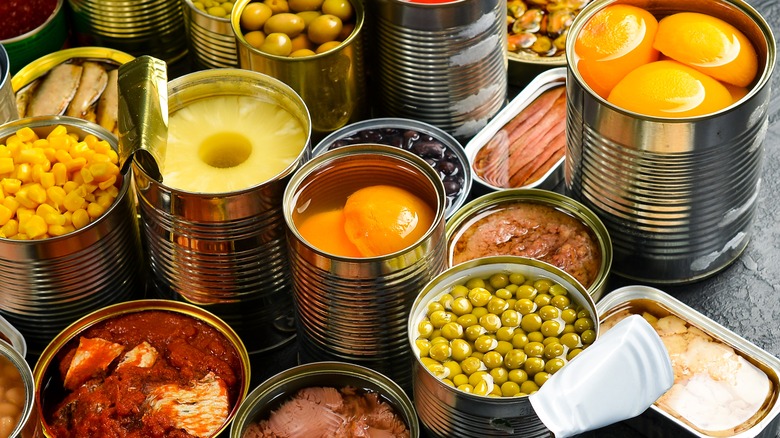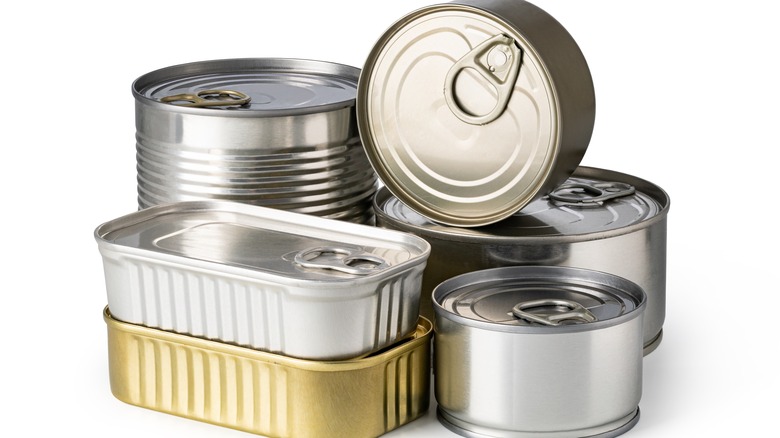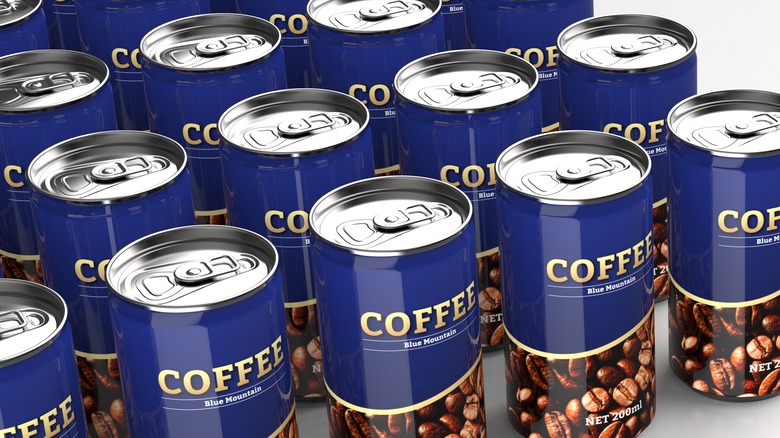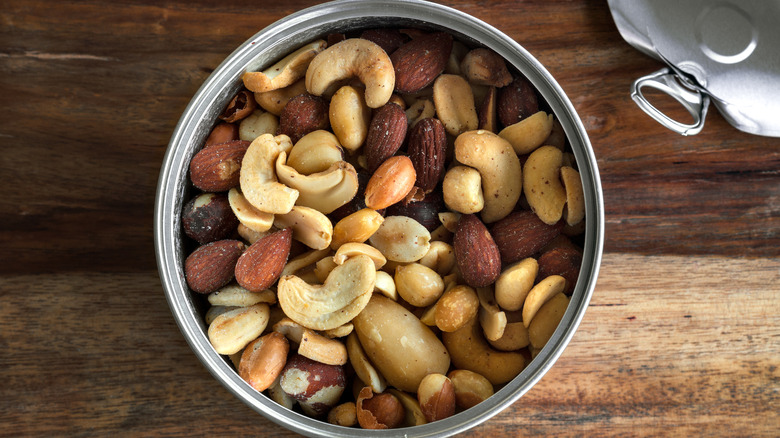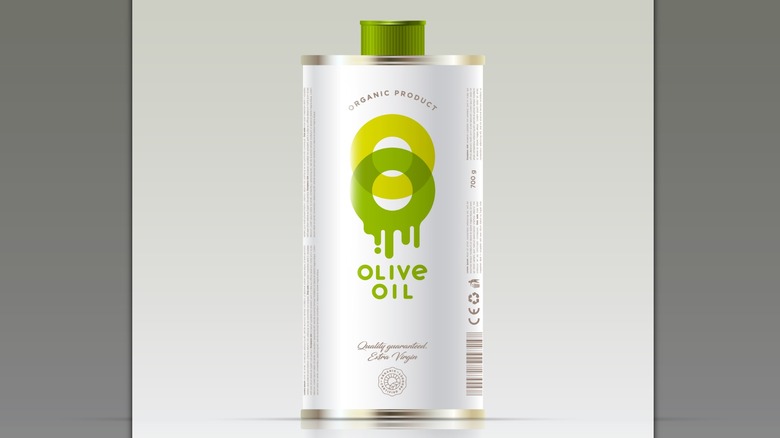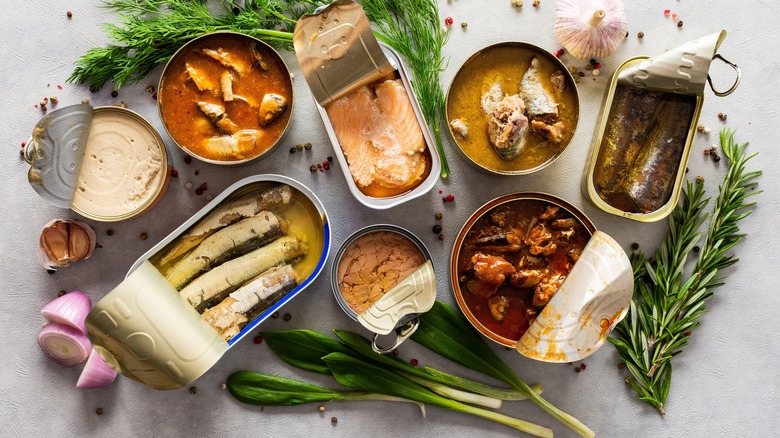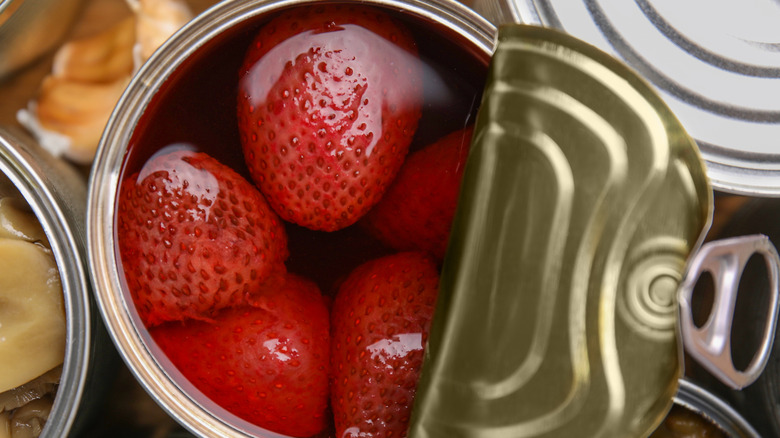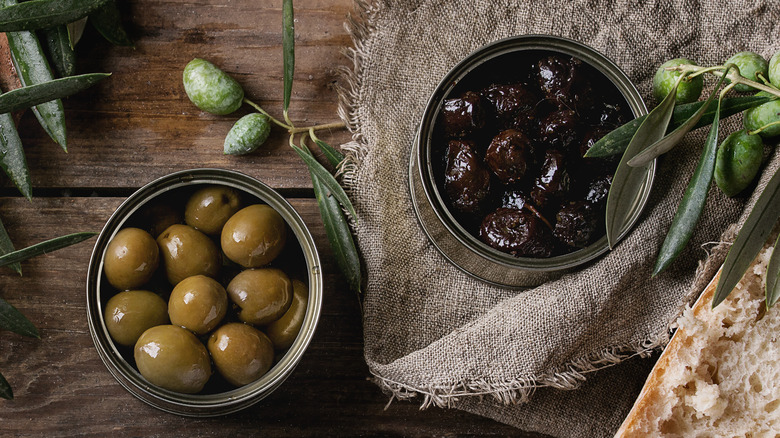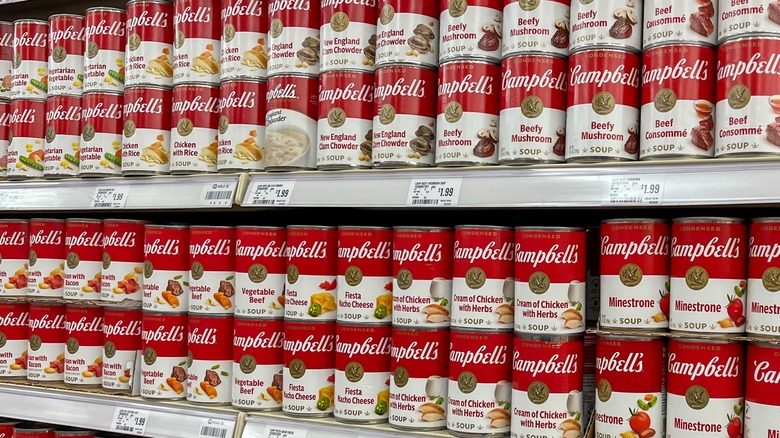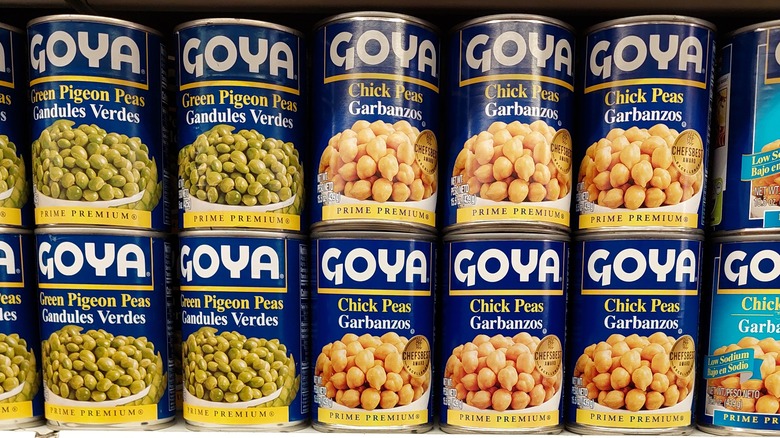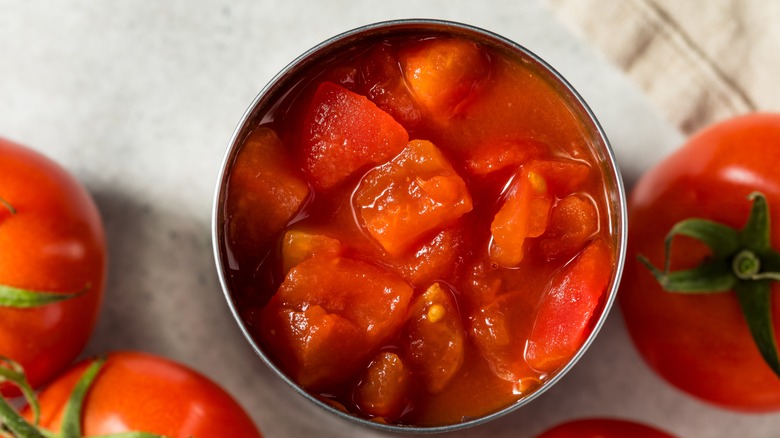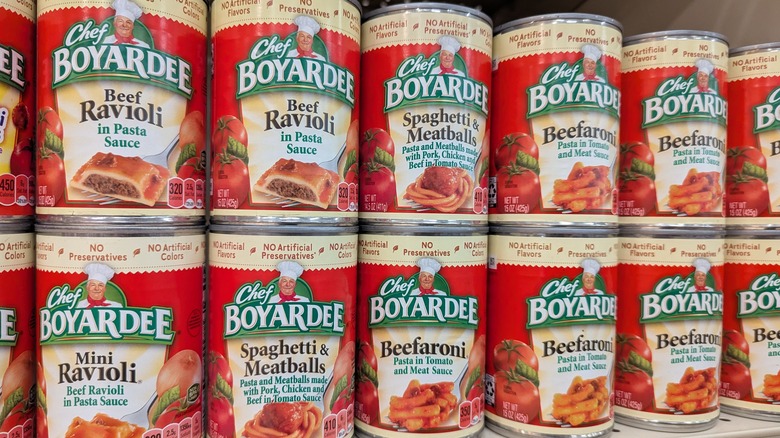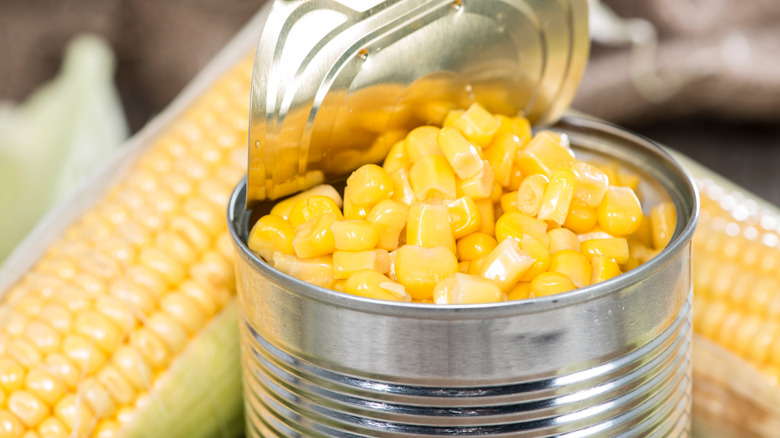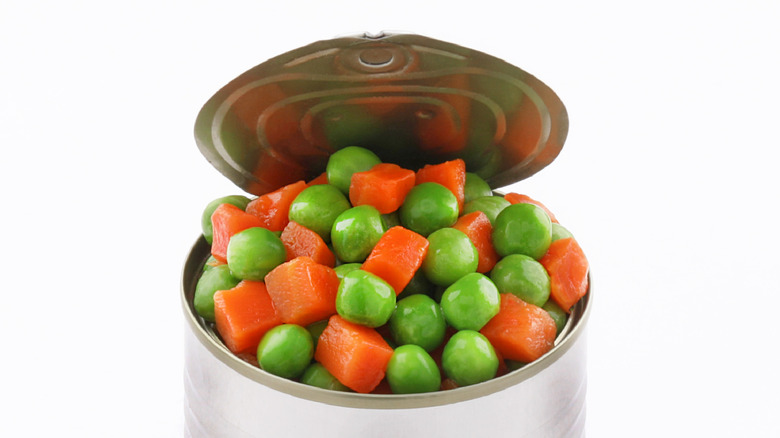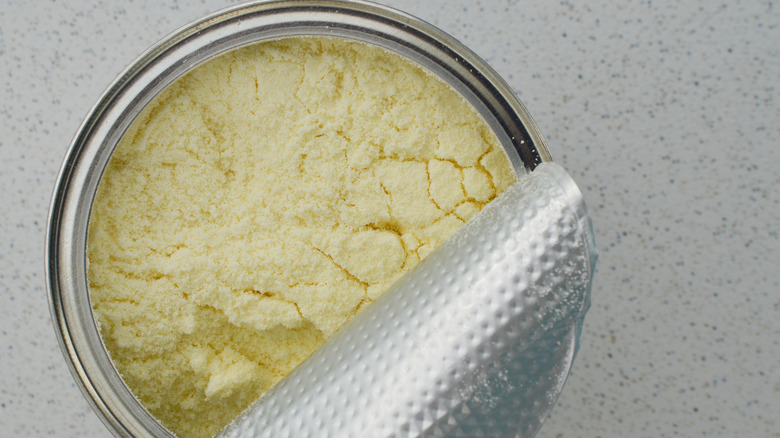14 Drinks And Canned Foods To Stock Up On Before Prices Sadly Increase
For decades, cans have been a convenient way for us to safely consume a wide range of foods and drinks. Everything from soups, vegetables, and oils can be stacked up in a kitchen cabinet and enjoyed at our leisure. Unfortunately, they're also among the items affected by the second Trump administration's economic policy.
On February 1, 2025, President Trump unveiled import tariffs on China, Canada and Mexico, followed by indefinitely extended exemptions in early March for the latter two countries. On April 2, "reciprocal" tariffs were levied on roughly 90 nations, starting at 10% and rising to 84% for China. Seven days later, Trump announced the levies would be suspended for 90 days, though a 10% tariff would remain in place — except for those against China which, at the time of writing, had been hiked to 145%.
If the reciprocal tariffs do go into force from around July 1, it's likely the costs of many goods on supermarket shelves will rise, as companies pass on the additional costs. Having an all-in-one-meal in can in the cupboard is a good plan, but here are drinks and canned foods it might be wise to stock up on before their prices go up.
The tariffs on cans
Plastic food packaging has long been the focus of many people's attention but it's been pushed into second place by the canned goods on supermarket shelves. In an open letter to President Trump in February, the Can Manufacturers Institute asked for an exemption to steel and aluminum tariffs, claiming at least 70% of the tin they needed to produce food had to come from abroad.
On March 12, Trump imposed a 25% levy on steel and aluminum imports, prompting retaliatory measures, notably from Canada, a major exporter of both metals to the U.S. In response, the CMI warned the country's inability to make enough cans on its own put it at risk of being "flooded" by cheaper canned foods from countries like China. On April 3, 2025, the 25% levy was extended to include empty tin cans.
Potentially caught in the middle of the tariff war is the American consumer. A study for Choices showed steel tariffs imposed during President Trump's first term increased costs for a range of canned foods — including those whose prices were declining at the time. At the time of writing, the 25% steel and aluminum tariffs still stood, with possibly more to come around July 1.
Coffee
Of all the canned goods affected by the tariffs, coffee may be among the most impactful for the United States. It cannot grow enough beans to meet domestic demand — which is actually second to only Finland. Nonetheless, The National Coffee Association dubbed it "America's favorite beverage," and said for every dollar spent on coffee imports, $43 was generated for the U.S. economy.
The tariffs come at a time of turmoil for the global coffee industry, mostly due to climate change affecting production and the COVID-19 pandemic, which have already sent prices climbing. The Trump administration's reciprocal levies on major producers of robusta coffee, such as Indonesia and Vietnam — which are facing 32% and 46% tariffs, respectively — haven't helped what was already a delicate situation.
Coffee prices plummeted when the tariffs were initially imposed, then rebounded just as quickly after the 90-day pause was announced, though the 10% base levy remains in place. If you buy your coffee by the can, it would be wise to stock up now before prices go even higher.
Imported beer and soda
Nothing beats cracking open an ice-cold beer or soda, slugging the contents and throwing the empty can in the recycling trash. That simple pleasure has already become more expensive, thanks to the 25% tariff on steel and aluminum, which was extended on April 3, 2025 to include imported canned beers made from malt. In 2024, they accounted for 38.5% of imports to the United States, with Heineken and Guinness among the most popular brands. Switching to glass bottles could save consumers money as they were not tariffed at the time of writing.
The extension of the steel and aluminum levy to empty cans has also affected the soda industry, including giant Coca-Cola. In an earnings call reported by CNN, CEO James Quincey said the company could switch to plastic or glass packaging to sidestep the tariff, but for other, smaller soda-producing businesses, that might not be an option. Metal prices are not the only tariff-related challenge Coca-Cola and other soda makers might face: China is a big supplier of the sweetener sucralose. Although currently not subject to levies that could change at any time, if you're a Pepsi fan, the company manufactures all its soda concentrate in Ireland, incurring the base 10% tariff which, like the rest of the European Union, could double on July 1.
Nuts
The Trump administration's tariffs have dealt a blow to many sectors in the United States, including the nut business. In January 2025, the U.S. imported $231 million-worth of tree nuts such as cashews, macadamias and Brazil nuts, notes the Peanut and Tree Nut Processors Association, while in 2024, exports were worth over $2.4 billion, per the USDA. "Truly, no sector of the nut industry is not impacted by these tariffs," said the Peanut and Tree Nut Processors Association. That will include American consumers.
As well as being hit by the 25% tariff on steel and aluminum, many of the countries that supply nuts to the U.S. face reciprocal levies, including Vietnam, South Africa, the Ivory Coast, and Brazil. Domestic companies buying nuts from these locations could pass on the additional costs to shoppers in America, while home-grown retailers may also hike prices to make up for potential losses from retaliatory duties. After all, it's happened before. Californian almond exports to China fell 25% due to tariffs imposed during the first Trump presidency, according to a statement from the California's Farm Bureau, as reported by The Los Angeles Times.
Cooking oils
Cans of cooking oil, whether vegetable or animal-based, are a staple in many American homes. Consumers may have already seen an uptick in prices thanks to the 25% steel and aluminum tariff imposed by President Trump. At the time of writing, Canadian-produced canola oil was not subject to tariffs, but the same can't be said of other cooking oil imports.
In 2023, the United States imported $850 million-worth of animal and vegetable oils from China, per Forbes, which is subject to a 145% tariff, imposed by President Trump. The U.S. is also a major importer of cooking oil from India and the Bahamas, and both have been hit with the 10% base tariff. If the reciprocal levies kick in around July 8, cooking oil from India will face a 26% tariff.
It's a slightly different story for olive oil. Cans of the versatile green-gold liquid would be affected by the blanket 20% tariff on goods from the European Union. However, even if the reciprocal levies were imposed, falling prices for olive oil and Turkish imports, which face only a 10% tariff, means American consumers might not feel the financial impact quite so much.
Fish
A report by the National Fisheries Institute revealed canned tuna was the third most-consumed fish in the United States in 2022. By 2025, NFI CEO Lisa Wallenda Picard warned in a statement that President Trump's reciprocal tariffs would make it "less available and more expensive," while putting 1.6 million American jobs at risk. Consumers are likely to feel the pinch too, should the levies be imposed on July 8.
Vietnam is the second-biggest exporter of canned tuna to the U.S., per Meksea Connection, while almost 40% comes from Thailand. It is facing a 36% reciprocal tariff, while Vietnam's stands at 42%. Another major source of tinned tuna is China. But it's not the only canned fish that could be more expensive by the summer.
The U.S. is the world's biggest importer of canned sardines, shipping them mainly from Sardines from China, Thailand, and Spain. China is already facing 145% tariffs, while the other two nations have been hit by a 10% base rate, as well as the threat of higher, reciprocal levies in July. The same goes for canned anchovies from Morocco, hit with the lowest tariff of 10%, while U.S. delis importing theirs from Spain face a price hike of 10% now and potentially twice that in a few weeks.
Fruit
Tinned fruits add a dash of sunshine to a fresh, tasty sorbet, but these sweet treats are at risk from price hikes. The Trump administration's 25% steel and aluminum tariffs prompted companies including Goya and Del Monte to sign a letter, sent by the Can Manufacturers Institute to the president, warning the levies could harm the industry.
Many of the countries supplying canned fruit were also hit with reciprocal tariffs in April that were suspended for 90 days. One notably affected import is canned strawberries, many of which come from Vietnam, as well as Honduras and Guatemala. All three are under the 10% tariff rate, but Vietnam's could reach 46% in July.
The levies also affect imports of canned peaches from Greece, which face the 20% reciprocal rate imposed on the European Union, and pineapples from Thailand and Indonesia, whose 10% tariffs could increase to 32% and 36%, respectively. Ironically, American shoppers looking to save money on tariffed fresh fruit could run into the same problem with canned versions.
Olives
People either love or loathe these fruits, which make a health-boosting addition to a charcuterie board, pep up a green salad, or bring a savory boost to a pizza. No matter how you eat them, canned olives are set to get more expensive in the coming weeks thanks, once again, to that 25% steel and aluminum tariff. Sadly, olives imported from Greece will be among several products bearing the brunt of the 20% levy on the European Union, part of the Trump administration's reciprocal tariffs that could come into force on July 1.
Both olives and olive oil avoided being tariffed in the President's first term but Greek exports to the United States worth $2.67 billion are at risk this time around. If you're also a fan of Greek feta cheese in a can, then chances are that's going to rise in price, too, for all the same reasons. Switching to home-grown olives and feta is an option but for an authentic taste of the Mediterranean, grab a few extra cans now.
Soup
One of the greatest things about canned soup is its flexibility. It can be cracked open when we need dinner in a hurry or want a flavorful pasta sauce. Unfortunately, the versatile but humble can of soup is also affected by the tariffs imposed by President Trump.
The tins they come in are subject to a 25% levy on steel and aluminum, which was expanded on April 3 to include empty cans imported to the United States to fill domestic production gaps. In a March earnings call, reported by CNN, Campbell's Company CEO Mick Beekhuizen warned the extent and duration of the tariffs could lead to changes in "pricing for some of our products."
It's not just the rising cost of metal that could inflate canned soup prices. Many of their ingredients come from countries that are subject to reciprocal tariffs, unveiled on April 2 — dubbed "Liberation Day" by President Trump. Although the levies have been suspended until July 1, shoppers could start to see a few cents added to their favorite brands of soup, as companies pass on the costs of tariffs.
Beans and legumes
Kids (and some adults) may look at the canned legume section of the supermarket and move swiftly on, but for millions of shoppers, they're a nutritional necessity. Canned legumes like lentils or chickpeas are a convenient, delicious way to boost the protein levels in a range of meals. Sadly, they too have fallen foul of the 25% steel and aluminum tariff, extended to include imported empty cans in April.
Although foods from Mexico were, at the time of writing, not subject to the President's tariffs, there is some bad news. The U.S. also imports canned refried beans from China — currently subject to a 145% tariff – and Guatemala, as well as tinned beans from Italy and Jamaica.
All three countries have been hit with a 10% tariff, which could double in Italy's case if the reciprocal levies are imposed on July 1. Green beans imported from Peru and India are also under a 10% tariff but the latter may also go up in price if the 26% reciprocal duty is imposed in a few weeks.
Tomatoes
Canned tomatoes are a store cupboard staple for millions of American households. There's a vast range to choose from, they're versatile, tasty, will last for months — and are set to be hard hit by the Trump administration's tariffs. Like all canned goods, they are subject to the 25% tariff on steel and aluminum, which was extended to empty imported cans in early April. However, the tomatoes themselves could become more expensive, too.
In April, amid all the international tariff headlines, President Trump also ended an import deal with Mexico, per The Wall Street Journal. From July, tomatoes from the country would be hit with a 20.9% levy. Experts warned there could be fewer tomatoes available as growers tried to reach deals with the Trump administration, and the American consumer would likely face higher prices.
As well as the fresh tomato market, canned imports will also be affected. The U.S. is a major importer of tinned tomatoes, notably from Italy, Spain and Portugal. The European Union countries are all subject to the 10% tariff, which could double if the reciprocal levies are imposed in early July.
Pasta
Considering the vast range of fresh and dried pasta available in the United States, it's a wonder the canned version is even a thing. For millions of people who grew up on it, or who know it's a quick, easy dinner, it's a store cupboard must-have. However, a can of ready-made pasta with sauce could be more expensive in the coming weeks, thanks to President Trump's tariff policy.
Since April, it has already imposed 25% on imported cans, but it's not the only pressure on prices: The ingredients inside the cans are also becoming more costly. Tomatoes imported from the European Union face a 10% levy that could rise to 20% if the reciprocal tariffs, paused for 90 days in April, come into effect in early July.
Likewise, spices shipped in from India could face a 26% tariff in a few weeks, while any Chinese ingredients have already been hit with a 145% levy. Sean Connolly, CEO of Conagra Brands, told Reuters the company would look at alternative suppliers but, to protect their margins, said, "We'll also look at targeted pricing."
Sweet corn
Sweet corn is one of the top three vegetable crops grown in the U.S., per the University of Florida. Despite that, it might surprise you to learn the U.S. also imports canned versions from China and South Korea. Domestic growers have been complaining about having to import non-GMO corn for years but the Trump administration's recent tariff policy has also impacted U.S. corn farmers. As well as hiking fertilizer costs, the tariffs against China have also made it cheaper to for domestic producers to grow soybeans than corn.
So what does all that mean for the American consumer? Well, likely price rises on cans of sweet corn. First, they are affected by the 25% tariff on steel and aluminum announced in April. Second, they are also hit by the imposition of a 145% levy on Chinese imports. Both costs, as with many canned imports, are set to be passed on to U.S. shoppers.
Canned vegetables
Many people use canned peas, carrots, mushrooms, and vegetables of all kinds to bulk out stews and soups, or to use as sides for their meals. They're convenient, affordable and – as with this canned veggie — taste as good as the fresh versions. The United States is the world's biggest importer of canned vegetables, per Volza, buying them from a variety of countries. Many of them are subject to a 10% tariff imposed by the Trump administration, but several could see the levies increased by reciprocal tariffs, set to go into force in early July.
Among the countries exporting canned vegetables to the U.S. are India, Morocco, Guatemala, and the European Union's Italy and Spain. Should the extra tariffs be imposed in the summer, India will face a 26% levy, while the E.U.'s will rise to 20%, likely increasing the cost of many canned vegetables. Home-grown varieties don't get off scot-free, either. They are already laboring under the existing 25% tariff on steel and aluminum that includes imported empty cans.
Baby formula and milk products
In 2022, a shortage of baby formula in the United States prompted Congress to pass a law suspending tariffs on the product to ease supply. Fast forward to 2025 and the situation has been reversed by President Trump. His tariffs — a 10% blanket rate, as well as the reciprocal levies, suspended for 90 days — do not exempt baby formula.
Alongside the 25% tariff on steel and aluminum, it's likely parents will face price hikes on brands such as HiPP, which is imported from the European Union and faces a 20% levy if the pause period ends with no deal. The U.S. tariffs may also impact the price of nutritional supplements, such as Ensure, whose ingredients are sourced abroad, as well as coffee mixers in cans and condensed milk products, some of which are imported from Malaysia. The country's current tariff rate stands at 10%, but come July, that could increase to 24%.
